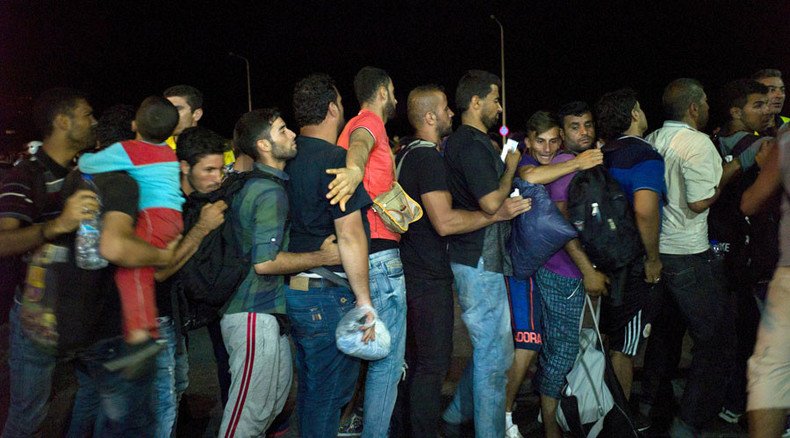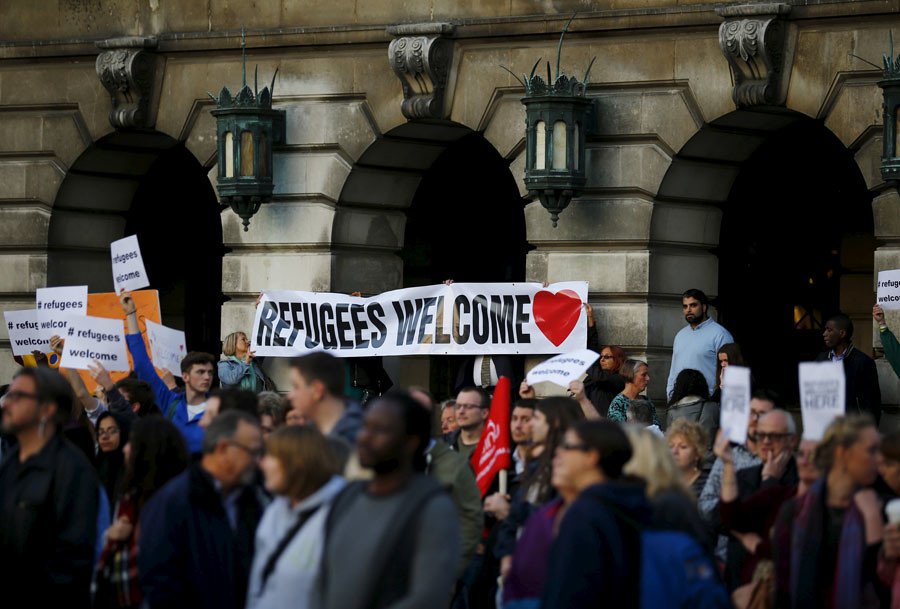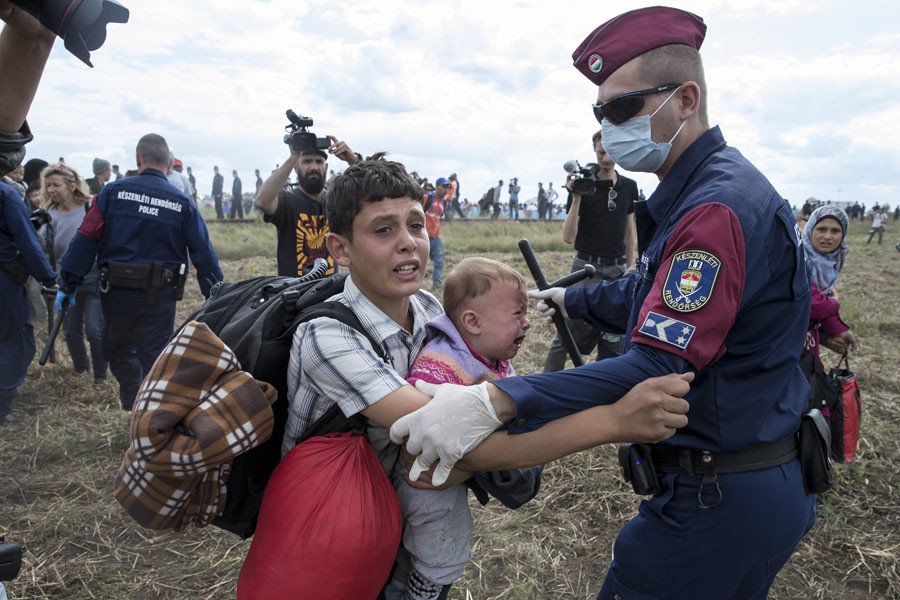‘Gulf countries could take up to 3mn Syrian refugees’

The Gulf States could easily accept up to three million refugees from Syria, but the problem is that they seem to prefer funding armed groups, including those in Syria, rather than assist people feeling the war, says Ali Al-Ahmed, Director of the Institute for Gulf Affairs.
RT: Do Gulf countries somehow contribute in assistance to the refugees from Syria or Iraq? We hear that most of the asylum seekers are fleeing to Europe, or at least to countries like Lebanon. What about Saudi Arabia, Qatar or the UAE?
Ali Al-Ahmed: The Gulf countries, specifically Saudi Arabia, Qatar, Kuwait and the UAE did not have any calculations or plans to contain the Syrian refugee crisis, and they have only contributed less than $10 million to assistance for the refugees in the past four years, according to the UN [High Commissioner for Refugees (UNHCR)]. So the issue here is very clear that the Gulf countries are more interested in funding armed groups - many of them are terrorists in Syria - rather than assist the Syrian people, invite them to live in the Gulf as skilled workers that can gain employment and make money for their families in safety, instead of having them travel in the midst of seas and the dangers that we see very clearly in the death of hundreds of Syrian refugees.
RT: What actions do you think should be taken by the Western countries in order to tackle this issue and to persuade the Gulf countries to accept refugees?
AA: I think it’s a very good opportunity for the Europeans and the Americans to join together to force the Gulf countries to take Syrian refugees. Syrian refugees in the Gulf are not going to be refugees – they will be working. There are no social, cultural and religious barriers for Syrian refugees in the Gulf. When they go to Europe they have so many obstacles in term of language barriers and cultural experience. It is better and cheaper for the Syrians to go to the Gulf, and that would change their status from refugees to expatriates, and we will solve this problem.
Political analyst Daniel Patrick Welch on military action in Syria that some leaders still push for: “It is clear that [Western military actions] are creating these refugees. All of these wars of conquest and of choice against Libya, against Yemen, against Syria, against Iraq, against Afghanistan have all destabilized the region. And these are all the ones that Europe has happily participated in. And European populations also have happily gone along with the first invasion of Iraq in the beginning. Everything else has been a cakewalk.”
…The travel of hundreds of thousands of migrants from the Middle East to Europe is really a huge problem that Europeans will pay for if they don’t shift the direction of these refugees to countries in the Middle East which can take them. The GCC countries can take very easily up to three million Syrian refugees with no major changes.
RT: How could we deal with this crisis?
AA: If you look at the refugee crisis in the Middle East, look at the Palestinian refugee crisis and the Iraqi refugee crisis, the best way to deal with this is not to create refugees and feed the refugee machine. The best way is to settle these people [in] temporary bases in the Gulf countries as workers. We have more than five million Asian workers, Indians, Nepalese and others from Asia who are in the Gulf. So it will not be very hard for the Gulf countries - which have need for skilled workers - to bring in one million Syrians to Saudi Arabia, half a million to Qatar – the highest per capita income in the world - the UAE has also a lot of capacity. Kuwait definitely has capacity to take, maybe up to 400,000. .. It would be cheaper for the Gulf countries in fact to take in the refugees as skilled workers and they will create up to $20 billion worth of economic growth within two years for the Gulf countries. So this is a huge bonus for the Gulf countries. The problem with the Gulf governments is their bigoted view of the Syrians, Iraqis and Palestinians. They see them… as one Kuwaiti official said [they] “do not belong in our environment.”
These Arab officials, Kuwaiti, Saudi officials are talking about Syrians who are Arabs...

‘UK could take far more than 20,000 refugees’
Political and social commentator Mohammed Ansar suggests the 20,000 refugees that PM David Cameron said the UK can accept will not solve the problem. With a million empty properties, Britain could do far better than that, he added.
RT: The EU - France and Britain included - is toughening its stance on Syria with the French President considering air strikes. But how are more bombings going to stop the refugee crisis?
Mohammed Ansar: I’m not convinced bombings are necessarily going to help with the situation with the refugees fleeing Syria with around 11 million displaced people there, there is talk now of a genocide and an ethnic cleansing in Syria. We’ve seen millions of refugees scatted around the world in the surrounding Arab countries and in Europe. I think the general consensus is that if we join in with the bombing, we join in with the airstrikes - and let’s keep in mind that the British Parliament and the MPs have voted overwhelmingly not to take part in allied and coalition airstrikes in Syria - it’s only going to worsen the problem.

RT: The French president and British prime minister have said the number of refugees they're willing to take. What difference will that make to the problem?
MA: I’ve been very active on social media over the last few weeks highlighting the hash tag #RefugeesWelcome and the refugee crisis in Britain. I think firstly we need to make a clear distinction between refugees and those who are migrants. The UN has said that overwhelmingly the people coming here are refugees, not migrants or economic migrants. I think 20,000… and I think we have to be clear here and commend the PM on his climb down and his U-turn, because earlier in the week he said he wasn’t going to be looking at taking any refugees and he was continually calling them migrants. So it’s great that he is calling them refugees, it’s great he is acknowledging the case, but 20,000 over the course of this parliament – that’s around about 4,000-5,000 a year up until 2020 - just isn’t going to deal with the problem. Britain is largely - 94% - empty country and we’ve got a million empty properties here. We could do far better than 20,000.
As of today, the UK is 94% empty. We have 1m empty properties. We can house 800k refugees at the drop of a hat. All we need is the will.
— Mohammed Ansar (@MoAnsar) September 6, 2015RT: The Survation poll for the Mail on Sunday shows that more people in Britain want to leave the EU than to stay. How is the refugee influx affecting their decision?
MA: The refugee crisis has become something of a wedge issue and I think the danger was going to be that with Hollande taking 24,000, with Angela Merkel merging her immigration and her refugee figures looking at around 800,000 in Germany. And we’ve people being welcomed as they are coming into Germany. The pressure was on the PM because this is going to become a wedge issue at the EU summit talks related to the Brexit or the British exit from the EU. If Britain wants to say “We are not part of the EU, we are not part of the borderless Schengen zone” - which is what the PM calls Europe now, I think British public opinion has been very much swayed by some of the rhetoric and some of the hard driven views which have been disseminated in British politics. I think in general from what I’ve seen – the wonderful British public and the generosity of spirit – they do have far more in common in terms of values and beliefs and the ethos of the great European project and we may see a return to some of that with the acceptance of more refugees.
LISTEN MORE:
The statements, views and opinions expressed in this column are solely those of the author and do not necessarily represent those of RT.












